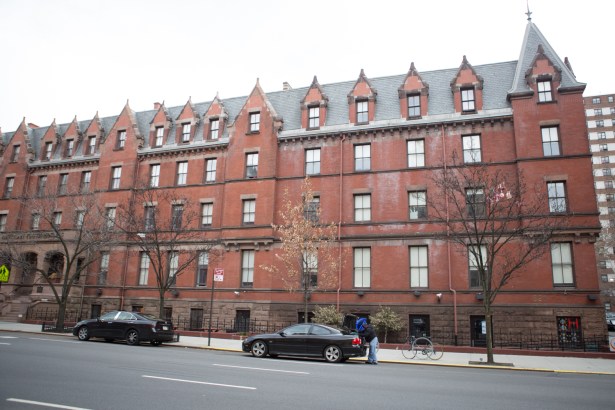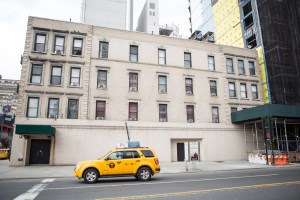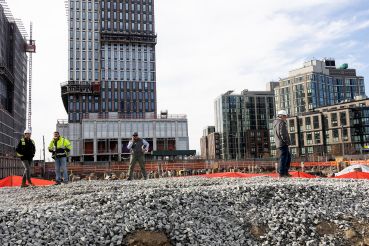Hostel Environment: Advocates of Dorm-Like Lodgings are Making Their Play for NYC
By Terence Cullen April 8, 2015 9:45 am
reprints
Gotham could be looking at a hostel takeover.
Hostel proponents are pushing to allow the dormitory-style accommodations back in the city after many have closed in the last few years. With the average hotel room rate in New York City at $295 per night last year, advocates believe hostels could attract an untapped clientele that might not otherwise come to a city as expensive as New York. A bed in one runs the gamut from $40 to $80 per night, according to various hostel websites. But tourism leaders believe it’s the exact opposite: allowing hostels to open in the city would only add to the existing “glut” of hotel rooms.
The debate over hostels stems back to a 2010 state law that was intended to shut down hotels that were illegal because they were unregulated. Hostel-related companies believe that 65 percent of New York City hostels have shut down as a direct result of the law, most immediately after the law went into effect. As a result, they say, the city is missing out on millions of dollars in economic activity.
“It’s shameful that New York City doesn’t allow youth hostels anymore,” said Councilman Mark Weprin, who introduced a bill last month to allow regulated hostels in commercial zones. “These hostels do nurture the future business people who will be spending their money on the mainstream for the future.”
Meanwhile, the popular rent-your-apartment website Airbnb has also been trying to fix the five-year-old legislation as it and the tourism industry lobby against each other. Tens of millions of dollars have been poured into campaigns on both sides to either fix the bill to allow for short-term rentals or stop the subletting site from doing business in the Empire State.
“You don’t want to have just rich people staying in New York City,” said Robert “Toshi” Chan, the owner of Flatiron Hotel whose former Hotel Toshi in Williamsburg was shut down for renting apartments at nightly rates. “The hostel clientele is completely different than a hotel. They can’t afford the hotels. If you don’t have hostels, they’re not going to come.”
Mr. Weprin’s city bill, currently in the Housing and Building Committee, would circumvent the state law that outlawed tenants in multi-unit buildings from subletting for fewer than 30 days. Hostels, advocates said, were an unintended target affected by the bill aimed at tackling illegal hotels. A 2013 bill in the state legislature was introduced to fix the issue, but did not pick up traction.
If the legislation passed, Mr. Weprin said, it would allow hostel operators licensed by the city to come in and build. The hostels would have to be regulated up to fire safety codes along with other requirements the run-of-the-mill hotel has to meet.
|
‘You don’t want to have just rich people staying in New York City. The hostel clientele is completely different than a hotel. They can’t afford the hotels. If you don’t have hostels, they’re not going to come.’ |
Companies that run hostel bookings blame the bill for the decline in city hostels while more have sprung up in Boston, Chicago and Washington, D.C. There are currently 29 operating hostels in the city, down from 85 when the bill was signed in 2010, according to a report published in February by Web Reservations International—the Dublin-based parent company of Hostelworld.com, which helps young travelers book cheap lodging.
As a result, the report argues, the city lost $240 million in economic activity per year in room stays, sales tax and other spending. Advocates for the bill argued these are young people who wouldn’t be able to afford a regular hotel—preferring to stay cheap anywhere from a night to a few weeks and spend their money on entertainment. By providing safe, up-to-code lodging, hostels could also be the first of many stays for a young traveler, they said.
The number of tourists flowing into the city every year has not dwindled, however. The annual number of tourists per year actually increased by 23 percent, from 45.8 million in 2009 to 54.3 million in 2014, according to data from the city’s tourism agency, NYC & Co.
“They’re the first rung of the hospitality ladder to help people get acquainted here,” said Jerry Kremer, a lobbyist for Hostelworld.com. “It’s almost like what a farm team does for a Major League Baseball team. The hostel guests ultimately become the hotel guests.”
Mr. Weprin, who said his mostly residential district in Queens would not be a prime hostel spot, said the potentially added hotel rooms would not interfere with the hotel industry—again stating it’s a demographic of young travelers who would otherwise not come here.
The Hotel Trades Council, the city’s hotel workers union, doesn’t see it that way, however, on the grounds that it would add to the growing surplus of hotel rooms as the demand for them dwindles. New York is currently third nationwide in terms of hotel supply, according to data collected by research firm STR, behind Las Vegas and Orlando. With roughly 29,000 hotel rooms across nearly 200 hotels in the pipeline, New York could have more than 142,000 hotels rooms, according to STR. The city would also have more than 800 hotels. And an HTC official said a strengthening dollar would diminish the demand for rooms by international travelers that the city saw in the last few years when it was cheaper to come here.

“This is not the time to be adding new supply,” said Josh Gold, the director of political and strategic affairs for HTC. “We’re already seeing a decline in the hotel sector. We have an unusual … situation here in New York, and actually a worse situation than the rest of the country.”
In addition to current concerns on room surplus, Mr. Gold pointed to a land hunt among developers for affordable and market-rate housing, commercial office space and manufacturing while lodging already occupies an abundance of land. Mr. Gold said that even if hospitality levels out down the road, hostels would have to go through a strong community approval process to deal with what he called “quality-of-life” concerns about young travelers who keep different hours than most other people.
“You see a mayor struggling to find land to build affordable housing,” he said. “We have a crisis in affordable housing and market-[rate] housing, yet we have a hotel glut that adds much more supply than demand. If there was ever a time we weren’t in a massive supply growth scenario and we want to consider hostels, we should ensure it goes through a rigorous community review.”
Hospitality leaders have not met with Mr. Weprin to discuss the issue yet, both sides confirmed. NYC & Co. does not have a position on the push for hostels, a spokesman said. Airbnb did not respond to requests for comment.


